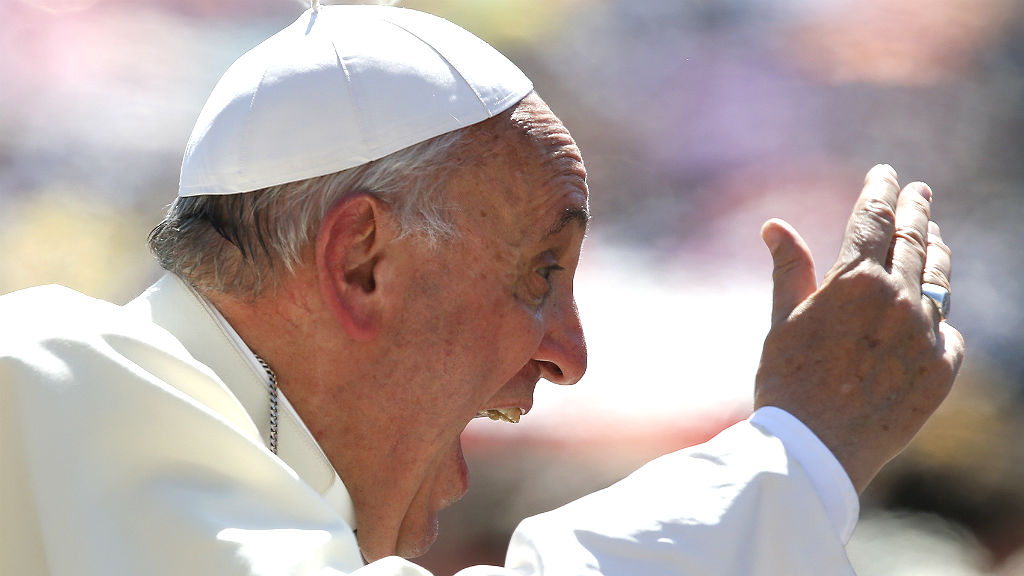Pope to Catholics: indulge yourself with a tweet
A new papal decree states that believers who follow this month’s Rio World Youth Day online could be entitled to an “indulgence”, a medieval spiritual incentive that reduces your time in purgatory.

If the internet represents the modern world, then the 2,000-year-old Catholic church represents tradition. So the news that the Vatican is now offering “indulgences” – in earlier times a sort of theological sentence reduction for those who die and go to purgatory rather than heaven – to online followers of the Rio World Youth Day (WYD) event, prompted a degree of bemusement among Catholics and some derision among non-believers.
Earlier this year the Pope announced that anyone attending WYD, traditionally a celebration of shared identity involving young Catholics from across the world, would obtain a plenary indulgence. It is not unusual for Catholic pilgrims to be offered such incentives to spiritual improvement – they were available in medieval times to pilgrims attending the famous shrine at Santiago de Compostela.
‘Authentic spiritual fruit’
Then, on 24 June, a papal decree, reported in the Corriere Della Sera newspaper, stated that: “The faithful who are legitimately impeded (from attending Rio WYD) can obtain the plenary indulgence if… they follow these same rites and pious exercises… always with appropriate devotion, by the new means of social communication.”
Believers might have been forgiven for thinking it was now possible to save themselves money and time simply by logging on and following events in Brazil from the comfort of their iPads.
Not so. Cue Monsignor Claudio Maria Celli, president of the pontifical council for social communications, who issued this stern warning: “You don’t get the indulgence the way you get a coffee from a vending machine… What really matters is that the Pope’s tweets from Brazil, or the photos of World Youth day that will be posted on Pinterest, should bear authentic spiritual fruit in the hearts of each one of us.
“Then even a youngster who is a very long way from Brazil and feels involved by a video, a simple text message or an email, will be truly taking part in the World Youth Day and will receive the gift of the indulgence.”
‘Best scam ever?’
The promise of an indulgence drove Richard Dawkins, Britain’s most famous atheist, to Twitter. “Twitter indulgences to shorten purgatory. Every time you think they can’t go any lower, they pull a stunt like this,” read one of his tweets.
Another said: “Get a year off purgatory for each follower to whom you RT the Pope… 100 yrs for each tweet you fave. Best scam ever?”
Twitter indulgences to shorten purgatory. http://t.co/mgRIUZLfiq Every time you think they can’t go any lower, they pull a stunt like this.
— Richard Dawkins (@RichardDawkins) July 17, 2013
But the Vatican’s attempt to blend the traditional and the contemporary also raised spiritual questions among those less sceptical than Mr Dawkins. Eleana Curti, deputy editor of the Tablet, the Catholic weekly, says the offer of an indulgence could be an acknowledgement of the practical difficulties in actually getting to Brazil.
“The key is those who are far away. They’re very conscious in Rome that a lot of young people won’t be able to get to Rio,” she told Channel 4 News. “At the same time, the Vatican wants to make as many young people as possible feel part of WYD.
“What Celli and others are saying is that if you prayerfully follow what is happening in Rio, it will be as good as being there for those young people.”
‘Picture language’
And how are modern believers supposed to square the medieval notion of a shortened stay in a place called purgatory with purgatory’s modern Catholic definition, as “the state of those who die in God’s friendship, assured of their eternal salvation, but who still have need of purification”?
Paul Murray, professor of systematic theology at Durham University, says human ideas of time and space are just “picture language” to evoke things that cannot be described in literal terms, and that the traditional definition of the indulgence is based on such out-of-date terminology.
“At the heart of what it (the Vatican’s offer of an indulgence) is trying to say is the effectiveness of prayer and our ability, in communion with the prayer of the church, to dispose ourselves to the healing grace of God,” he told Channel 4 News.